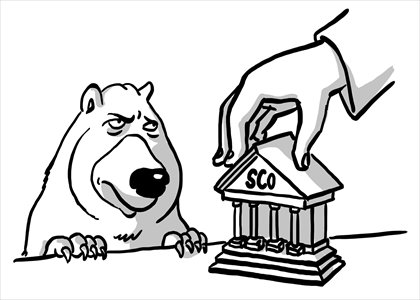Yang Cheng:Russia uncertain over prospects of SCO bank
Source:GLOBAL TIMES
Reprint link:http://www.globaltimes.cn/content/811845.shtml
Yang cheng:Russia uncertain over prospects of SCO bank

Illustration: Liu Rui/GT
As Russian President Vladimir Putin has put it, Russia is part of the wider world. But Russia's current foreign policy mainly focuses on regional affairs, as returning to the status of a global superpower is too far away a dream for it at present.
Regionally, Russia views the post-Soviet republics, especially Central Asian countries, as its strategic backyard. Moscow is unwilling to see any other big powers dominate this region.
However, in recent years, China's influence in Central Asia has been growing, particularly through its economic efforts.
Although China and Russia have established a model comprehensive strategic partnership and achieved remarkable results within the framework of the Shanghai Cooperation Organization (SCO), a Sino-Russian relationship featuring a mixture of cooperation and competition is being formed in Central Asia.
The SCO, comprised of China, Russia, Kazakhstan, Kyrgyzstan, Tajikistan and Uzbekistan, has been viewed by some as a means adopted by China to expand its influence in Central Asia.
China has proposed the creation of an SCO development bank with the primary aim of financing the development of Central Asian member countries.
Russia knows that Central Asia needs such a bank to improve the economic conditions of the region and hopes to get a helping hand from China. Nonetheless, it is more concerned about China's growing economic strength in this area and it has been demurring from contributing funds to the proposed bank.
But what is noticeable is Russia's active engagement in the BRICS bank. It is Russia that promoted the meeting of financial ministers of BRICS countries in order to turn an academic concept into a recognized coalition of emerging powers bearing significant implications for international relations against the backdrop of a tense relationship between Russia and the West.
Russia's national strength doesn't allow itself to challenge the Western world nowadays, but the proposed BRICS bank can be an engine for the multipolar world that Russia dreams of. It also helps establish a fairer and more reasonable international financial order.
The BRICS bank cannot replace the US-led International Monetary Fund or the World Bank even over the long term, but it is a strategic card that Russia will not give up. As the New York-based scholar Cynthia Roberts has pointed out, Russia's BRICS diplomacy cleverly leverages China's power to help lift the status of all participating countries, particularly Russia, in the global rebalancing.
From a Russian perspective, the development banks under the SCO and BRICS differ greatly. First, Russia worries that China may expand its political influence in Central Asia by relying on its economic strength within the framework of the SCO development bank, while among BRICS countries, there is a somewhat balanced economic structure. There is no major power that can dominate the mechanism. India and Brazil can balance China's power, while Russia can seek more advantages from it.
Second, Russia has tightened its international strategic agenda and is unwilling to counter the West alone as a "revisionist state." The BRICS bank can put China at the fore while supporting Russia's idea of a polycentric world, which suits Russia's strategic needs. Comparatively, any consensus within the framework of the SCO will be interpreted by the West as the joint efforts by China and Russia to challenge the West. Russia will not only have little economic benefits, but also lose room strategically.
In the BRICS bank, Russia will be more of a beneficiary than a financier, while in the SCO development bank, it's a different situation.
Russia academia believes that the potential leadership in BRICS may be Chinese, and Russia should avoid letting BRICS become a Chinese project. This shows the complexity of the Sino-Russian relationship under the SCO.
Without Russia's consent, a SCO development bank cannot be realized. Only when Russia completes its strategic arrangement in Central Asia and believes that China is no threat, or Russia's external environment gets worse and it needs China and the SCO to crack the Western isolation, can the agenda of the SCO, including the development bank, be moved forward.
The author is deputy director of the Center for Russian Studies, School of Advanced International and Area Studies, East China Normal University. opinion@globaltimes.com.cn
